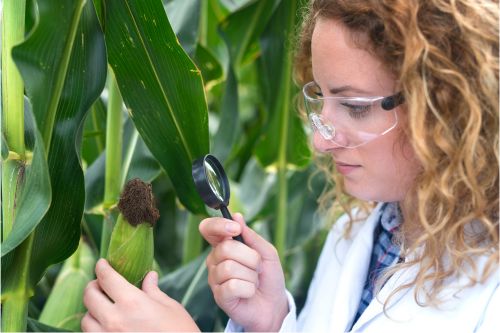Table of Contents
- Best environmental science degree Australia
- What will you learn from environmental sciences programs?
- Why study environmental science in Australia?
- Top 5 universities to pursue environmental science degrees
- University of Melbourne
- Australian National University (ANU)
- University of Queensland (UQ)
- Monash University
- University of Western Australia (UWA)
- Salary after pursuing environmental science degrees in Australia
- Key takeaways
- FAQs
Best environmental science degree Australia
Australia is a prominent global leader on earth and environmental issues. The city of Sydney hosted the first-ever Earth Hour in 2007, and the country actively participates in other significant international ecological events like the annual World Environment Day. Studying environmental sciences and sustainability will teach you to use biology, chemistry, physics, and other sciences to solve environmental problems. It will lead you to develop strategies that impact ecological policies, planning, and management. This blog will discuss how studying environmental sciences and sustainability in Australia can offer you the knowledge and skills to positively impact the Earth. You will also learn about the top universities to pursue environmental science programs in Australia. First, let’s get to know more about environmental science programs.
What will you learn from environmental sciences programs?
Environmental sciences and sustainability courses teach you about global, regional, and local environmental challenges. You’ll also get the practical skills necessary to make a difference.
There are numerous courses available in this field. You can specialize in practical sciences (like chemistry or biology) or social sciences (like policy and planning).
Various courses provide a general overview of environmental topics (for example, environmental studies and environmental safety). You can even research specific ecosystems, such as rainforests or marine areas.
Some of the subjects you can research include-
- Environmental impact assessment
- Soil and water conservation
- Natural resource management
- Environmental biology
- Global warming
- Wildlife conservation
- Marine protection
- Renewable energy
- Environmental health and safety
Why study environmental science in Australia?

Here are a few reasons why Australia is a fantastic place to study-
1. Excellent education
Australian universities’ solid environmental sciences and sustainability programs emphasize interdisciplinary approaches and real-world applications. Courses in Australia match worldwide standards, so you can be confident that your ecological sciences and sustainability studies will be helpful wherever you go.
2. Research prowess
Australian universities are also well-known for their environmental sciences and sustainability research. Many universities feature sustainable development research centers and institutes where students can participate in cutting-edge research projects and receive hands-on experience.
3. Career possibilities
The subject of environmental sciences and sustainability is quickly expanding, and there is a growing demand for individuals with relevant knowledge and abilities. Graduates in Australia are well-prepared for various occupations in government, non-government organizations, the corporate sector, research, and consulting.
4. Nature access
Australia is noted for its rich natural environment, which includes the Great Barrier Reef, bushland, desert, and rainforest. This allows students to study and examine the environment in its natural habitat.
5. Australia is at the forefront of environmental sustainability
Sustainability is an essential answer to common ecological, economic, and social concerns. The Sustainable Development Goals (SDGs) of the United Nations help to make sustainable development a worldwide priority, with shared objectives and responsibilities.
According to the most recent rankings, Australian universities are at the forefront of global sustainability.
In the most recent QS World University sustainability rankings, 12 Australian universities were among the top 100, with two ranked within the top ten.
Top 5 universities to pursue environmental science degrees

Environmental science has become an increasingly important field of study as we strive to address pressing global challenges such as climate change, biodiversity loss, and sustainable development.
Look at the top five universities in Australia for pursuing environmental science programs. The following institutions are renowned for their commitment to excellence in environmental education and research.
University of Melbourne
Best Universities for Environment/Ecology- 48th
Best Global Universities- 27th
It consistently ranks among the top universities globally and is a best universities in Australia for environmental science. Melbourne University’s strong emphasis on research and multidisciplinary collaboration enables students to engage in cutting-edge research projects and gain practical experience. The Parkville campus, located near natural reserves and research facilities, provides an ideal learning environment for environmental science students.
Australian National University (ANU)
Best Universities for Environment/Ecology- 64th
Best Global Universities- 62nd
ANU, located in Canberra, is renowned for its excellence in environmental science and ranks highly in global university rankings. The Fenner School of Environment and Society at ANU offers various environmental science programs integrating scientific understanding with policy development and societal implications. ANU boasts world-class research centers, such as the Fenner School’s Earth and Environmental Science Research Centre, which provide opportunities for students to engage in groundbreaking research projects. The university’s location in the heart of the nation’s capital also offers access to government agencies, environmental organizations, and policymakers.
University of Queensland (UQ)
Best Universities for Environment/Ecology- 7th
Best Global Universities- 36th
UQ has international recognition for its strong sustainability and environmental research emphasis. The School of Earth and Environmental Sciences at UQ provides diverse programs in environmental science, covering specific areas like marine science, ecology, and climate change. UQ’s world-class research facilities, such as the Global Change Institute and the Sustainable Minerals Institute, provide students with unique opportunities to collaborate with leading experts in the field. The university’s proximity to diverse ecosystems, including the Great Barrier Reef, rainforests, and coastal environments, offers students unparalleled fieldwork and research opportunities and it is considered one of the best universities for environmental science in Australia.
Monash University
Best Universities for Environment/Ecology- 82nd
Best Global Universities- 37th
Monash University in Melbourne is highly regarded for its environmental science programs. The university’s School of Earth, Atmosphere, and Environment provide a range of undergraduate and postgraduate programs in environmental science. It focuses on areas such as climate change, water resources, and land management. Monash University fosters strong industry connections, offering students valuable networking opportunities and industry placements. The university’s state-of-the-art research facilities and collaborations with government agencies and industry partners enhance the practical relevance of its programs. Monash’s Clayton campus is located close to various nature reserves, allowing students to engage in fieldwork and gain firsthand experience in environmental research.
University of Western Australia (UWA)
Best Universities for Environment/Ecology- 53rd
Best Global Universities- 83rd
UWA in Perth is one of the top universities to pursue Environmental Science and research capabilities. UWA’s School of Biological Sciences and Oceans Institute offers a range of specialized programs in environmental science, including marine and coastal science, conservation biology, and environmental policy. The university’s research strengths lie in marine ecology, biodiversity conservation, and climate change impacts. UWA’s proximity to diverse ecosystems, including the Swan Coastal Plain and the Indian Ocean, provides students with unique fieldwork opportunities. The university’s collaborations with local environmental organizations and industry partners further enhance students’ knowledge and perspective.
Salary after pursuing environmental science degrees in Australia
| Job role | Annual salary |
| Sustainability Manager | $90,000 – $120,000 |
| Research Scientist | $80,000 – $110,000 |
| Environmental Consultant | $75,000 – $95,000 |
| Environmental Scientist | $70,000 – $90,000 |
| Conservation Biologist | $60,000 – $80,000 |
| Environmental Educator | $50,000 – $70,000 |
Key takeaways
- Australia is a world leader in many areas, including earth and environmental challenges. The inaugural Earth Hour was conducted in Sydney in 2007, and the country also plays a significant part in other worldwide ecological events, such as the yearly World Environment Day.
- Universities in Australia have a strong presence in the most current QS rankings for both earth sciences and environmental science.
- You can work as a sustainability manager, research scientist, or environmental consultant after graduating from top universities in Australia.
Please don’t hesitate to contact us if you’re interested in studying abroad and want information on Top universities to pursue Environmental Science programs.
Liked this blog? Read next: Thompson Rivers University MBA fees | A detailed guide
FAQs
Q1. What are the English language proficiency tests needed to study in Australia?
Answer- Individuals who do not have English as their primary language may need to take standardized tests, such as TOEFL or IELTS, to demonstrate their English language proficiency.
Q2. What are the top five environmental issues in Australia?
Answer- According to the reports, the ecology in Australia is poor and deteriorating due to climate change, habitat loss, invasive species, pollution, and resource extraction.
Q3. How does Australia address its unique environmental challenges, such as biodiversity conservation and climate change?
Answer- The country has established national parks, marine protected areas, and World Heritage sites to conserve its diverse ecosystems. Additionally, Australia is a signatory to international agreements and frameworks, such as the Paris Agreement, to combat climate change.






